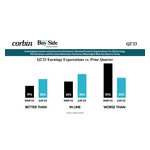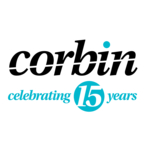Survey Finds Converging Investor and Executive Sentiment, Elevated Investor Expectations for Q2 Earnings Performance, and Pervasive Recession Concerns; Meaningful Risk Ascribed to China
- 29% self-describe as Neutral to Bearish or Bearish, down significantly from 52% in Q1, and more, 36%, report current sentiment as Neutral, up from 24%
- The more optimistic executive tone heard last quarter is tempering, with 40% of investors now characterizing outlooks as more Neutral, up from 34%
- 38% anticipate results to be In Line sequentially, with more expecting Better Than and significantly fewer baking in Worse Than performances QoQ; 41% expect consensus beats
- 80% continue to expect a U.S. recession while 56% identify monetary policy, specifically interest rate actions, as the leading concern for the third quarter in a row
- Debt paydown remains the top preferred use of cash by 70%, a new survey record, followed by stockpiling dry powder (hoarding cash) and reinvestment
- 82% assign a High level of risk to companies with exposure to China, above the one-year average of 72%
Click Here to Access the Full Report
HARTFORD, Conn.–(BUSINESS WIRE)–Corbin Advisors, a strategic consultancy accelerating value realization globally, today released its quarterly Earnings Primer®, which captures trends in institutional investor sentiment. The survey, which marks the 55th issue of Inside The Buy-side®, was conducted from June 12 to July 7, 2023, and is based on responses from 78 institutional investors and sell side analysts globally, representing ~$6.3 trillion in equity assets under management.
Following last quarter’s survey that found a notable disconnect between investor sentiment and management tone, with investors more bearish and bracing for impact, this quarter’s survey reveals investor views are converging with those of management — bearish investor sentiment has receded while management tone is now perceived as reflecting increased caution, resulting in a more neutral outlook collectively. Underscoring attitudes are stronger than anticipated Q1 prints on the heels of what was perceived as better than expected annual guides, juxtaposed with continued slowing growth and pervasive recessionary concerns.
Rebecca Corbin, Founder and CEO of Corbin Advisors, commented, “We’re at an interesting juncture as we head into the Q2 earnings season. Q1 performances and persistent executive talk of second-half strength boosted confidence and gave the markets a new lease on life after a year of downshifting in 2022. At the same time, concerns about rising interest rates are proliferating, recessionary fears persisting, and management tone — heard as more upbeat last quarter — has tempered. With valuations at these levels, the market is primed more for perfection than not. Even with the obvious risk factors out there, including the continued inversion of the yield curve and its lingering potential implications for the banking sector and broader economy, along with diverging consumer credit and savings, there are some bright spots. Despite cost cutting actions, companies continue to reinvest at relatively high levels and while concerns over a “white collar recession” emerge with mounting reports of layoffs, the consumer continues to spend amid still-strong employment trends. With microcycles becoming more in focus, companies have the ability to demonstrate differentiation. Reinforcing strategy and execution in support of long-term growth, addressing near-term actions to protect profitability and managing expectations at this hairpin turn will serve to build management credibility.”
Leading topics for executives to address on upcoming earnings calls include margins, which are expected to have been under continued pressure, updates on inflation and pricing power, and volume/demand trends.
In terms of sequential performance, 38% anticipate results to be In Line, with more expecting Better Than and significantly fewer baking in Worse Than performances QoQ. Notably, this is the lowest level of respondents predicting sequential deceleration since Q1 2022.
To that end, 45% expect sequential top-line stability versus a falling off the cliff as was the expectation heading into 2023, while 42% anticipate margin pressure. EPS and FCF growth see the most significant barbell views, with nearly equal numbers in the Improving and Worsening camps. Across all KPIs, a majority expect annual guidance to be Maintained. Still, over one-third are bracing for lower margins, EPS, and FCF outlooks.
Pravir Singh, CFA, Director of International Research at Schafer Cullen Capital, commented, “My sentiment is more cautious near term and bullish long term. The equity market is in some sort of transition phase where the leaders of the last ten years, high valuation technology stocks, should hand over leadership to a different group of companies, perhaps industrials. That process is playing out right now and given that we have an inverted yield curve, I still think that we might have a bit of a recession and another leg down in the bear market. I’m optimistic over the long term as many well positioned companies, trading at reasonable valuations, should continue growing their earnings and dividends but I am a little bit more cautious near term given that 2023-2024 earnings growth could disappoint, and we may need to see a change in the leadership of the market.”
Notably, 36% report Holding equities at this time, retreating from a survey record of 58% last quarter, while over half, 52%, report Buying or Rotating, up from 42%.
Reflecting persistent recessionary fears, shared by 80% of respondents, and increasing interest rates, debt paydown remains the most supported use of cash by 70%, a new survey record, with those preferring a Net Debt-to-EBITDA level of 1.5x or lower crossing the majority threshold, at 54% and up from 40% last quarter.
Most Western economies are expected to Worsen for the remainder of 2023, led by the UK, Canada, and the U.S., respectively, while Asian countries (ex-China) are expected to Improve.
Views on China over the next six months register the largest swing in bearish sentiment QoQ (+34 pts), and 79% express More Concern or a Continued High Level of Concern (aided) over U.S.-China relations. Furthermore, 80%+ assign a High level of risk to companies with exposure to China, above the one-year average of 72%.
Turning to sector sentiment, bulls continue to pile into Tech after the cold shoulder treatment in Q4 while Healthcare and Biotech remain among the top bullish bets. Financials see more support, while Building Products push out bears amid resilient backlogs and REITs remain out of favor despite some thawing of record bearish sentiment seen last quarter.
Since 2007, Corbin Advisors has tracked investor sentiment on a quarterly basis. Access Inside The Buy-side® and other research on real-time investor sentiment, IR best practices, and case studies at CorbinAdvisors.com.
About Corbin Advisors
Corbin is a strategic consultancy accelerating value realization globally. We engage deeply with our clients to assess, architect, activate, and accelerate value realization, delivering research-based insights and execution excellence through a cultivated and caring team of experts with deep sector and situational experience, a best practice approach, and an outperformance mindset.
Inside The Buy-side®, our industry-leading research publication, is covered by news affiliates globally and regularly featured on CNBC.
To learn more about us and our impact, visit CorbinAdvisors.com
Contacts
Media
Dylan Yaworski, (860) 269-9698
Dylan.Yaworski@corbinadvisors.com






